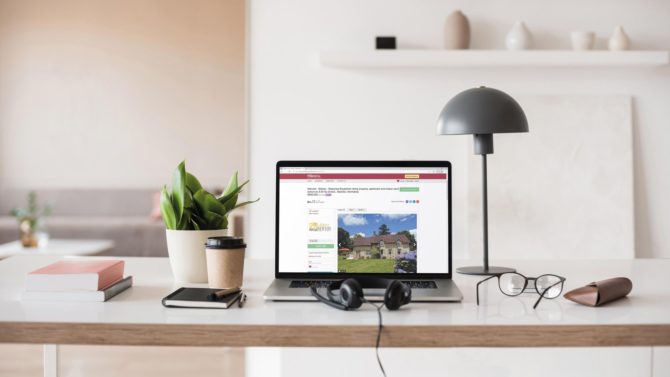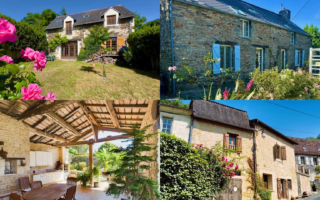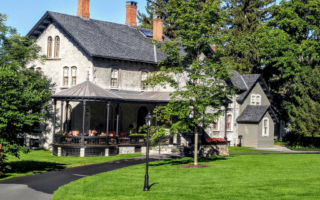Pandemic progress: How Covid-19 has dragged French estate agencies into the 21st century

Every cloud has a silver lining, and an upside of the coronavirus pandemic has been a leap forward in the use of technology in French estate agencies – great news for British buyers of French property, says agent Dan Newton
Until a couple of years ago, you could have easily argued that French estate agents were in the dark ages. I can remember when the fax machine came out and we were all thinking ‘Great, no need to send details by post anymore’. Then our estate agency tried sending our first photos to would-be buyers only to find that the thermal fax paper produced big black smears down the page. Luckily my father was an artist and we personally managed to get around it by doing line drawings of each house.
Then came the World Wide Web and all of a sudden we could send colour photos to clients all over the world – though the files were small and not brilliant quality.
After that, France’s lesser god of real estate deemed that enough innovation had taken place for a while and nothing really changed for the next couple of decades.
SOLE AGENCY CONTRACTS
For many years, putting your property on the market exclusively with one agency was your worst possible choice in France. After all, there was absolutely no difference between a sole agency agreement and an open mandat, except that agencies with the latter arrangement might put more effort into marketing those properties because they were competing with other agencies for the sale. With a sole agreement in the bag, they could sit back and relax somewhat.
other agencies for the sale. With a sole agreement in the bag, they could sit back and relax somewhat.
As a result, fewer than 10% of properties on the market were being marketed by a sole agency. In order to persuade potential clients to choose their agency above others, the basic strategy of agents was to give people just enough information to get them interested, but not an iota more. If househunters wanted more details, they had no choice but to go to the agency and sign a bon de visite in order to view the property.
With this bon de visite paper, agents have proof that they have introduced a potential buyer to a particular property. For sole agents, this stops the buyer negotiating directly with the vendor and trying to dodge paying the agency’s commission. If the property is marketed by multiple agencies, it doesn’t actually legally bind the buyer to going with that specific agent, but it does tend to instil that sense of obligation in the househunter.
Either way, this jealous guarding of details was not ideal for British buyers trying to narrow their property shortlist from across the Channel.
COVID CURVEBALL
Then suddenly something unexpected happened that gave the whole profession a proverbial kick up the rear. Yes, you’ve guessed it – a global pandemic.
During the confinements in France, nobody was allowed to travel further than 10km from their homes, and don’t even mention those who wanted to travel from abroad on house-hunting trips.
In the first lockdown, agents kept themselves busy with the ongoing sales. These were taking much longer due to most of the notaires‘ offices being on skeleton staff, but this didn’t last for ever (although you might have thought so if you were going through a sale or purchase at the time). It suddenly dawned on agents as they sat there twiddling their thumbs behind locked office doors, that selling houses during the lockdown wasn’t going to be easy.

Luckily for them (and you) the technology did exist. After all it was already being used by estate agents across the world. All the French agents started looking into virtual tours, Zoom meetings and electronic signatures. I wouldn’t say we have caught up with the rest of the world, but at least we are now in the 21st century!
There are still issues with how much information agents will give you. Asking for the address or Google coordinates won’t get you far, for example, as most agents are still on open mandats and therefore unwilling to give you directions to a property that may have a rival agency’s ‘à vendre’ sign outside.
But at least you can see interior video tours and, if the 4G is good enough, you might even get a live video tour via WhatsApp or similar. More agencies are also starting to do floor plans and offer more photos to potential clients.
The good news is that foreign travel has opened up (albeit with tests and concerns about new Covid varIants) so you can finally come over and physically see properties you’re interested in. And with their newfound toys, agents can help you preselect your properties from your own homes and be much more time-efficient once you are here.
For the visits, there are still rules to respect, including everyone wearing masks and using hand gel. We also air and sanitise the properties before and after each visit so your safety is still provided for. In fact, you could be refused a visit if you don’t respect the mask and hand sanitiser rules.
HIGH DEMAND FOR FRENCH PROPERTY
Another factor to take into account is that properties are now moving extremely fast. In pre-Covid rural France, selling houses was a long-term project, taking an average of 18 months. Now properties are regularly being sold the same day we take them on, and quite often at the full asking price. So, if you do think you have found your dream home, I would strongly suggest making your offer as soon as possible. Also, be prepared to offer a decent price, if not the asking price, as it is very much a sellers’ market at the moment.
Another result of agents upping their game, coupled with the rise in homeworking, is that there has been a complete U-turn on the 50-year mass exodus to major towns and cities. Buyers are now ‘going for green’ (as long as they can still access hi-speed internet for work), which means that rural and semi-rural properties are getting harder and harder to find. Many agents have a 10th of the number of listings that they had two years ago and, with stock low, prices are rising.
Indeed, it is now the rural properties that are exploding in price, something practically unheard of in France. Until recently, regional price increases were usually in the order of 1-3% per annum and in the rural areas we didn’t even bother calculating the price change as it was often more a case of negative equity.
Now in certain rural communes, we have had price hikes of up to 30% in the space of 12 months! It will slow down, but rural properties will continue to rise in price in a healthy way for a few years yet. If on the other hand, you are looking for a town centre third-floor flat with not even a 3ft square balcony, then this is definitely your time to buy!
SELLER’S MARKET IN FRANCE
Sadly, some who already own a holiday home in France have returned after an enforced hiatus to find their property looks more post-apocalyptic than picture postcard.
If you don’t have the will or energy to get it back to its former glory, you may be asking yourselves ‘should we sell?’ Well, certainly the time is good, but your property probably isn’t looking its best.
The good news is that, due to the shortage of properties, many agents are now willing to go the extra mile, for example by getting lawns cut back and arranging for houses to be cleaned. This isn’t necessarily a great expense as, with the market as it is, as long as the asking price is ‘correct’ you will no doubt find a buyer quickly, and depending on how long you have owned it, there is a good chance of making a healthy profit.
So, behind every cloud there is a silver lining, even if that cloud was a big black storm cloud that encircled the whole world!
Dan Newton is the Director and co-founder of Agence Newton estate agency
Share to: Facebook Twitter LinkedIn Email
More in French property buying guides, French Property News, Selling French property


